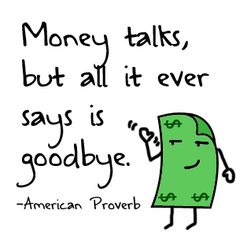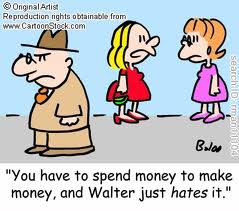|
When was the last time you couldn’t wait to go back to work? Most of us choose to do whatever is available, instead of what we love, because we need to pay our bills first. Or do we really? In this video I am sharing an eye-opening piece of research that proves the opposite: if you do what you love, you have a much bigger chance to get rich. I also give you a quick exercise that will help you find more meaning in your work. Now I'd love to hear from you: do you love what you do? What do you truly enjoy doing? Post your answers in the comments below!
2 Comments
I have just finished running a free coaching training called The Money Marathon, where participants for one week were given a virtual sum of money to spend every day. This helped them explore, what was in the way of getting as much money as they wanted. I'm sharing below some observations and tips that will hopefully be helpful to everyone who wants more financial abundance in the lives. These tips will be especially useful for you if you don't care much about money, and think there are more important things in life.
1. Money is NEVER a problem Spending petty cash daily is easy, and this gives us an excuse that "we have no money to follow our dreams". However, when The Money Marathon participants were suggested to spend large sums (from 50,000 pounds and above) and the money suddenly stopped being a problem, most of them still felt very uncomfortable and ended up spending on things they didn't think they need or refused to spend it at all! What often blocks us from abundance is not money, but unwillingness to take the responsibility for our own decisions, to make choices, or the fear of making a mistake. What to do about it: to identify your blockage around, train your imagination. Imagine you needed to spend a certain sum daily (without being able to save it for the next day), and multiply it by 2 every day. When do you get blocked? 2. Silence these voices If you lack money, you most likely subconsciously associate it with problems. For instance, if you believe that "earning money means sacrificing my health", of course you would avoid any opportunity to earn a bit of cash, or only find those that actually make their life harder, making this belief a self-fulfilling prophecy. As absurd as it may sound, such beliefs often come from our family and often act on a subconscious level and are often difficult to identify. What to do about it: make them conscious! Do an audit of your beliefs about money and check where these beliefs come from (most likely you inherited it from your close family members). Then decide if you still want to use it in your life, and if not, reformulate it into something better. For example, if your belief is "earning money costs health", and this has got you to the place where you aren't earning anything and as a result you are constantly stressed and got sick because of it, this isn't a very good belief, is it? So you can consciously re-formulate it into something like "Earning money allows me to take of my health". 3. Use your body wisdom Your body is the first to know whether you have any blocks around money. It will know that faster than your brain (no wonder, as it has millions of nerve cells perceiving information!). You will feel discomfort or a liberating sensation when thinking about spending it in a particular way. How to use it: If you need to make an important purchase (i.e. a new car, or a new house), but have no money for it, use your body to experience what it could be like to own this thing. Go to a test-drive, try on some really luxurious items in the shop or arrange a few viewings of flats (even though you don't currently have any cash in hand). Money may not fall out of nowhere, but when you use your body to experience what it's like to "own" the thing, you get more motivated to look for ways to earn/gain money. Many people who used this trick found ways to get credit/earn extra within weeks of engaging their body into the process. 4. Time IS money Often people who struggle with earning or saving money also struggle with time management. Think about how you spend money and compare with how you spend time. What do you spend it? How do you talk to yourself when you procrastinate? Do you value your time, or are you happy to give it to anyone who asks for it at any point? Do you make "time investment" into some activities that are important to you? What are some patterns between spending money and time that you can identify? I'd love to read how these tips make a difference - post them in the comments! You can read the whole marathon tasks and do them here - Day 1, Day 2, Day 3, Day 4, Day 5, Day 6 and Day 7. Sign up for my newsletters to receive similar challenges!
|
Need that kick to get your life going?
|












